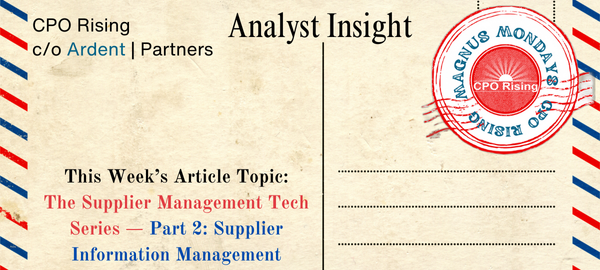Last week we started a series of articles on supplier management. In that article, we covered some of the functionality that’s needed across all the components of supplier management. This week’s article will focus on one of these components or functional areas: Supplier Information Management (SIM).
SIM is the process of collecting and managing the information necessary to do business with a supplier. What this means varies between organizations depending on their maturity level and industry. Some companies require more extensive information about their suppliers, while others only collect the bare minimum to transact. Even within organizations there are variations. You will likely want to collect more information about a strategic partner than a local catering supplier (unless catering is critical for your business). This means that a supplier management solution needs to be flexible and configurable.
SIM is a fundamental component of supplier management technology, and you can argue that many SIM capabilities are, in fact, platform capabilities. But for proper supplier information management, you need greater sophistication, including the ability to support supplier onboarding, manage supplier profiles, enforce data governance and control, as well as improve and enrich the data needs. Let’s take a high-level look at the core SIM capabilities.
Supplier Onboarding
Supplier onboarding is focused on the first part of supplier information management (i.e., collecting the information needed to do business). It’s a combination of messaging and workflow functionality that enables you to request information from a supplier and then walk the supplier through the process of submitting that information — followed by review and approval steps. Parts of this process can be automated, and some solutions support data sharing and pre-population if the supplier has already submitted information (i.e., they have other customers using the same solution). It’s also possible to leverage third-party data providers to collect available data about suppliers (see data enrichment below).
Supplier Profiles
Supplier profiles sit at the core of SIM. This is where you store the data and information about the supplier. Supplier profiles are directly linked to the data model and schema of your supplier management solution and should be flexible and extensible as you collect various data for different suppliers. You also need to define what parts of the data are visible for whom. Some data is for internal use only while other data is both visible and managed by the suppliers. If the solution provider uses a network architecture, some data is likely public in the network and sharable.
Governance and Control
Supplier data can be critical for business continuity or other sensitive purposes, making it a target for fraudulent use. Therefore, it’s important to ensure that the system supports proper governance and control. This is especially true if the SIM solution is used for supplier master data management purposes. Consistent data synched across various systems is critical to mitigating supply disruption. Any supplier changes to critical data points should include alerts and approval steps prior to being pushed out to other systems.
Tracking changes and keeping audit trails is also important to ensure full traceability and transparency.
Data Improvement and Enrichment
As mentioned above, there are cases when significant amounts of data is collected from suppliers. Such data likely contains some errors and/or expiration dates. This can mean significant effort for the supplier to enter and maintain. To help with this, SIM solutions should be able to use rules or more complex algorithms to check or verify data against expected formats or value ranges.
Public or proprietary data sources can also be used for validation, but also to automatically add data to supplier profiles. This data can be basic data that pre-populates the supplier profile and reduces manual work., It can also be other types of data to extend supplier profiles, such as credit, risk, or ESG scores that a third party has calculated.
Upcoming: Supplier Performance Management (SPM)
SIM can almost be viewed as part of the platform for supplier management solutions of any kind, but the capabilities above are somewhat specific for SIM. Thus, it makes sense to treat SIM as a specific domain or module. Next week we will publish an article on a slightly different topic before we get back to the supplier management tech series to have a look at Supplier Performance Management, so stay tuned.
In the meantime, don’t hesitate to reach out if you have any questions or opinions. Ardent Partners is here to help!


